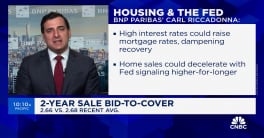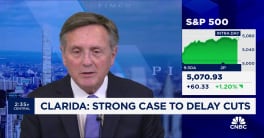Plenty of people, including Matthew Graham, MortgageNewsDaily's op-ed columnist, are talking about the practical realities of freezing a mortgage rate adjustment under the plan President Bush announced last week. After reflecting I would like to raise some objections of my own and/or reflect comments from others, about this "solution" to the mortgage mess that may ultimately be nicknamed Katrina Two.
First of all is the issue of fairness.
The window of opportunity to participate in the rate freeze
is 30 months wide (January 2005 - July 2007) but some of this creative financing
was going on well before that start date. It is likely that few subprime loans
were made after the cutoff date of July 2007 as non-conventional lending pretty
much shut down about that time, but why should someone who took out a 5-year
adjustable hybrid loan on Christmas Eve 2004 be treated any different than the
borrower who waited until the first week of the new year to purchase or refinance
a house?
Likewise, the borrower who has already slipped down the rabbit hole of delinquency
- maybe even as recently as last month - cannot take advantage of the rate freeze.
The President's program may slow the volume of cases entering foreclosure hell,
but those who are already there might as well hand over the keys. It appears
on our reading of the rules that a borrower who is now 30 or 60 days behind
and manages to bring his loan current cannot reset his eligibility for the rate
freeze.
Joe Scarborough of MSNBC raised another fairness issue. What about the homeowners who bit the bullet in the first place, taking out a conventional mortgage even though the payments were a stretch rather than getting a reduced fare ride for one, two, or five years? Some of these conventional loans were ARMs which will be adjusting as well, although with more modest affects but these borrowers will get no relief.
The issue of fairness is part of a larger problem. The program is simply not designed to help very many people and those who will continue to slip through the cracks will also continue to wreak havoc on their neighborhoods and communities as homes are left vacant and susceptible to vandalism and property taxes go unpaid.
Then there are practical issues.
Matt Graham raised one in his column; an indication that the infrastructure is simply not set up to handle the program. Anyone who has had to deal with a mortgage servicer over the last five or six months will tell you that collections and loss mitigation departments are overwhelmed. Phones are not answered, messages are not returned, and borrowers looking for a workout or a short sale are left dangling right through the rap of the auctioneer's gavel. How these servicers are ever going to handle a potential wave of up to a million freeze requests is impossible to imagine. Even with "counselors" used as gatekeepers, approval must still be received from the servicers and this is hard to accomplish when phones are not answered or emails returned.
The program is voluntary and while supposedly most servicers and investors have signed on to the program and reports from Wall Street indicate that the large hedge and pension funds are convinced they will ultimately receive a greater return by participating than by insisting on enforcing the original terms of the loans, what about the smaller investor, especially global ones? It may be pretty hard for a fund in Dubai or, heaven forbid, the government of China to accept that their expected 9 percent return will not materialize for five years while that 3 percent teaser rate keeps on ticking. And if these investors do refuse to participate in the freeze, what of the fairness to the borrowers with the bad luck to have mortgages sold to a Saudi sheik rather than to Goldman Sachs?
And what of the paperwork? Certainly those who claim they cannot afford their new payments will have to prove it. Under current procedure for workouts or to have a short sale approved borrowers must provide a bucket of information. A typical list of documents would include recent bank statements, pay stubs, a hardship letter, two years federal tax returns, and a financial statement. I have worked with several borrowers seeking short sale approval and have found that these paperwork requirements, particularly the financial statement, are above the sophistication level of many and that servicers can take months to review and approve them. If, in the interim, the rate resets and the borrower falls behind in his payments does he lose his eligibility for the program?
Finally, there is already political fallout from the announced program - lets call it the "dog in the manger" syndrome. Much chatter in the coffee shop and on talk radio the last few days about rewarding risk takers and/or deadbeats. Those making the most noise are usually those with 6 percent fixed rate mortgages and more than enough income to support them but it seems that many people don't want others to have something they don't even if the cause is worthy and may ultimately benefit a larger universe than the recipient.
Perhaps all of the problems I foresee have been anticipated by NEW HOPE Alliance and procedures are in place to ensure the freeze initiative is seamless. It would be wonderful if at least one rescue operation out of the White House left people in their homes rather than sitting on their roofs or totally under water.







